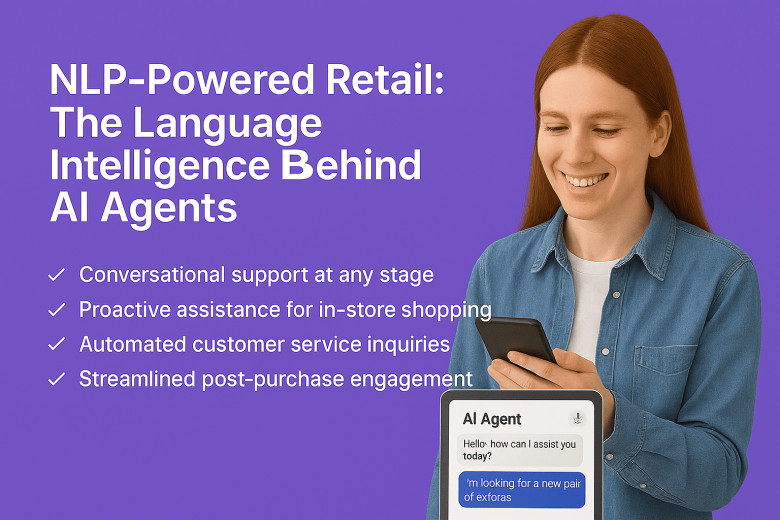views

In the digital-first economy, retail and ecommerce are no longer just about products—they are about experiences. Modern customers expect instant, intelligent, and personalized interactions at every touchpoint. And at the core of these experiences lies one transformative capability: Natural Language Processing (NLP).
As the foundation of every AI agent for retail and ecommerce, NLP enables businesses to understand, interpret, and respond to human language in a way that’s fluid, contextual, and increasingly human-like. From chatbots to voice assistants, NLP is redefining the dialogue between brands and their customers.
In this article, we explore how NLP powers AI agents in retail, the technology behind it, and how it’s shaping the future of intelligent commerce.
What is NLP in Retail AI?
Natural Language Processing (NLP) is a subfield of artificial intelligence that focuses on the interaction between computers and human language. In the context of retail, NLP enables AI agents to understand and process customer queries, sentiments, commands, and even unstructured feedback in natural language—whether it’s spoken or typed.
In short, NLP makes it possible for an AI agent for retail and ecommerce to:
-
Understand customer questions in real-time
-
Interpret slang, typos, and tone
-
Personalize responses based on context
-
Maintain coherent conversations across sessions
How NLP Enhances AI Agents for Retail and Ecommerce
The rise of AI agents for retail and ecommerce is tightly bound to advances in NLP. Here’s how NLP enhances their performance:
1. Conversational Understanding
NLP equips AI agents with the ability to understand queries like:
-
“Do you have this in red?”
-
“What are your return policies?”
-
“I’m looking for a gift for my dad.”
These aren’t just keyword searches—they require semantic understanding. NLP interprets intent, sentiment, and context to deliver accurate responses.
2. Sentiment Detection
AI agents can gauge a customer's emotional tone—whether frustrated, excited, or indifferent—and adjust their tone and response accordingly. For example, an annoyed customer might be escalated to a human agent faster.
3. Multilingual Capabilities
With NLP, AI agents can understand and respond in multiple languages, expanding access to global audiences without requiring additional staff for each locale.
4. Voice-Based Interaction
NLP enables AI agents to process spoken language, allowing for hands-free shopping, voice search, and smart home integrations through platforms like Alexa or Google Assistant.
5. Smart Product Recommendations
By analyzing unstructured queries like “I want something cozy for winter,” NLP lets AI agents translate vague language into real, personalized product suggestions.
NLP Use Cases in AI-Powered Retail Experiences
An AI agent for retail and ecommerce can use NLP in several impactful ways:
-
Customer Support: Automatically handle FAQs, delivery inquiries, or complaints with empathetic and intelligent responses.
-
Product Discovery: Help customers describe what they want in natural terms, then translate those into product attributes and search results.
-
Feedback Analysis: Analyze customer reviews and feedback to detect patterns, common complaints, or desired features.
-
Order Management: Enable customers to modify, track, or cancel orders using conversational language.
-
Virtual Shopping Assistants: AI agents can engage in real-time, back-and-forth conversations, guiding customers through the journey from awareness to checkout.
Technology Behind NLP-Powered Retail AI Agents
The capabilities of NLP-powered AI agents are driven by several technological components:
-
Tokenization & Parsing: Breaking down text into words and parts of speech to analyze structure and intent.
-
Named Entity Recognition (NER): Identifying names, dates, prices, and other entities within text.
-
Intent Classification: Understanding what the user wants to achieve—e.g., buy, return, inquire, browse.
-
Contextual Embeddings: Using AI models like GPT or BERT to understand words in context, not just by dictionary definitions.
-
Dialogue Management Systems: Keeping track of multi-turn conversations, so the agent doesn't lose context between messages.
Retailers Already Using NLP-Powered AI Agents
Top retail brands have already embraced NLP in their AI strategies:
-
Sephora: Uses AI chatbots to help customers find makeup based on natural language preferences like “something bold for a party.”
-
H&M: Engages shoppers through a virtual stylist that interprets preferences shared in conversational language.
-
Amazon: Alexa allows voice-based ordering, shopping, and product tracking.
These applications demonstrate how an AI agent for retail and ecommerce powered by NLP can drive both engagement and conversions.
Challenges and Best Practices
Despite its promise, NLP adoption comes with challenges:
-
Training Data Quality: NLP agents need high-quality, domain-specific datasets to perform well.
-
Language Nuances: Slang, regional idioms, and sarcasm are still difficult for machines to fully grasp.
-
Maintaining Context: Longer conversations may confuse poorly designed agents if not backed by robust dialogue systems.
Best practices include continuous training, feedback loops from human agents, A/B testing, and ensuring fallback mechanisms for unclear queries.
Future of NLP in Retail
Looking ahead, NLP will continue to evolve in exciting ways:
-
Emotionally Intelligent Agents: Understanding not just what customers say, but how they feel.
-
Voice-First Shopping: More immersive experiences through smart devices.
-
Proactive Conversations: Agents initiating engagement based on behavioral cues and past interactions.
-
Hyper-Personalization: Using NLP to deliver product suggestions and content that match customer personas in real time.
Retailers who invest in these technologies now will be at the forefront of a new era in commerce—where machines understand humans like never before.
Conclusion
The convergence of NLP and AI agents is setting a new standard for how brands communicate with their customers. From guiding shopping journeys to resolving complex inquiries, NLP makes AI agents more than just tools—they become extensions of your brand’s voice and values.
For every forward-thinking brand, adopting an AI agent for retail and ecommerce powered by NLP isn’t just a trend—it’s a strategic advantage. As customer expectations grow, language intelligence will be the key to staying relevant, responsive, and truly customer-centric.



Comments
0 comment